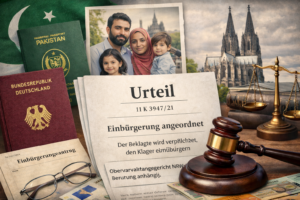Higher Regional Court of Hamm, 10.09.2013, Case No.: 2 Ausl 95/11
The extradition of foreign nationals to other countries for the enforcement of sentences in Germany is governed not only by domestic laws but also by the Constitution and international law, which also applies in Germany.
The role of international law is defined in Article 25 of the Basic Law:
According to Article 25 of the Basic Law (GG), the general rules of international law are an integral part of federal law. They take precedence over laws and directly create rights and obligations for the inhabitants of the federal territory.
Article 25 GG thus reflects the openness of the Basic Law to international law, granting the rules of customary international law and general principles of law a “mid-level” status between ordinary laws and the Constitution in the national legal order.
In the aforementioned judgment of the Higher Regional Court of Hamm, the court had to decide whether the extradition of a woman who committed crimes in Romania to Romania would violate the Constitution and international law.
Background: Conviction of the Defendant in Romania
In 2004, the defendant was convicted in absentia by a Romanian district court for several fraud offenses committed between 1999 and 2000. This conviction also included six previous criminal convictions. The court imposed a total prison sentence of 5 years and 9 months. At the time of the conviction, 3 years and 6 months of the sentence remained to be served.
Life in Germany: Integration and New Life
Since entering Germany in 2010, the defendant has lived with her child and partner in Bochum. She is a trained seamstress but was most recently employed as a cleaner. During her time in Germany, she has not committed any criminal offenses. Her integration into German society and her family situation indicate a stable life that would be significantly disrupted by a possible extradition.
Romania’s Extradition Request and the Defendant’s Objections
In 2010, Romania submitted an extradition request to enforce the remaining prison sentence in Romania. However, the defendant raised objections to this request. In response to these objections, the Higher Regional Court (OLG) of Hamm repeatedly requested detailed information from the Romanian authorities regarding the offenses, the underlying criminal proceedings, the detention conditions during pre-trial custody, and the current prison conditions in Romania. Despite multiple requests, some essential questions remained unanswered.
Examination and Decision of the Higher Regional Court of Hamm
After thoroughly reviewing the case, the OLG Hamm declared the requested extradition of the defendant inadmissible. The decision was based on the applicable legal provisions, which state that extradition is only inadmissible if it violates binding international minimum standards or fundamental constitutional principles of the German legal order.
The court found that in this case, such a violation existed because the extradition of the defendant would violate the constitutional principle of proportionality. This principle requires that state measures, particularly those with significant impacts on individual rights, be proportionate to the purpose pursued.
Proportionality and the Particular Circumstances of the Case
The OLG Hamm based its decision on the overall circumstances of the case, which made the extradition appear disproportionate. A key factor was the long period since the offenses, which had already occurred 12 to 16 years before the decision. This period was further extended by the more than two-year-long extradition process. Additionally, part of the sentence had already been served through pre-trial detention in Romania.
The defendant claimed that she was traumatized by her pre-trial detention in Romania and still suffers from the psychological effects. These claims were not refuted by the Romanian authorities. The lengthy extradition process also posed a significant burden on the defendant. In light of these circumstances, the court found it disproportionate to extradite the defendant to Romania to serve the remaining sentence.
Unresolved Questions and Legal Uncertainties
Another crucial point was the uncertainty regarding whether the defendant had been adequately heard during her previous convictions. The written court decisions provided by the Romanian authorities indicated that the defendant had been convicted in absentia. However, the Romanian courts also stated that the defendant had been present for two of the convictions following proper summons. This contradiction has not yet been satisfactorily explained.
Moreover, the OLG Hamm noted that in the last conviction of the defendant, a previous conviction with an excessive sentence was included in the combined sentence, leading to an incorrect overall sentence. This also argued against the legality of the extradition.
Finally, questions about prison conditions in Romania and the specific effects of pre-trial detention on the defendant were not adequately answered. The information provided by the Romanian authorities was incomplete and left essential aspects open. Given these unresolved questions and the existing legal uncertainties, the Higher Regional Court of Hamm ruled that the defendant’s extradition was inadmissible.
Conclusion: Extradition Deemed Disproportionate
The OLG Hamm concluded that extraditing the defendant to Romania would not be compatible with constitutional principles. The proportionality of the measure was undermined by the long period since the offenses, the defendant’s psychological burdens, the unresolved legal questions, and the insufficient information regarding prison conditions. For these reasons, the requested extradition was declared inadmissible.
Source: Higher Regional Court of Hamm
Important Note: The content of this article has been prepared to the best of our knowledge and belief. However, due to the complexity and constant evolution of the subject matter, we must exclude liability and warranty. Important Notice: The content of this article has been created to the best of our knowledge and understanding. However, due to the complexity and constant changes in the subject matter, we must exclude any liability and warranty.
If you need legal advice, feel free to call us at 0221 – 80187670 or email us at info@mth-partner.de.
Lawyers in Cologne advise and represent you in immigration law.




